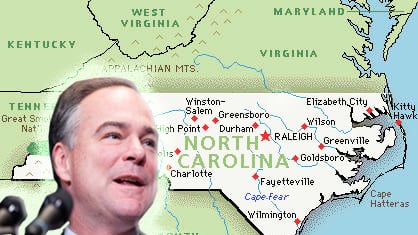When the Democratic National Committee announced Tuesday that it would hold its 2012 national convention in Charlotte, North Carolina, it was widely interpreted—with the DNC's explicit encouragement—as a strategic decision.

"President Obama's selection of this Southern city for the 2012 Democratic convention signals he will... fight for the conservative-leaning states that helped him win the White House," the Associated Press reported. DNC Chairman Tim Kaine told The New York Times, "We were very excited about winning North Carolina in 2008. Putting our convention there is a very serious sign that we intend to compete there again." The conversation immediately turned to whether North Carolina, a typically Republican state that President Obama carried by a slim margin in his 2008 landslide victory, could go Democratic in what is likely to be a closer contest next year and what role the convention will play. Influential Democratic blogger Markos Moulitsas of the Daily Kos cheered, "It's clear Obama's team will go all-in to hold North Carolina, and holding the convention in Charlotte is a key component of that strategy."
Obama and the Democrats may well want to compete in North Carolina, and they may even be able to, but holding their convention there will probably have nothing to do with who wins its 15 Electoral College votes. Academic studies have found where political conventions are held has no measurable impact on how the states vote that November.
That makes sense when you think about the nature of modern presidential campaigns. In the age of 24-hour cable news and viral YouTube clips of political speeches, what happens within the tightly controlled perimeter of a convention center in front of out-of-town partisans is no more or less accessible if you're down the street or on vacation in Alaska. "The conventions could be on the moon," says Ken Bickers, chairman of the political science department at the University of Colorado and co-author of a forthcoming paper on the non-effect of convention locations. "As long as the media covers it, it doesn't matter where it is."
It signals that Democrats don't plan on ceding the South, a point that may be intended to burnish Obama's image as a unifier or to force Republicans to spend resources in those states, as much as to win the states themselves.
And yet the idea that putting your convention in a crucial swing state will help you win it shows no signs of abating. "It's one of those little pieces of conventional wisdom that political professionals seem to subscribe to but it's not borne out in empirical fact," says Richard Powell, a University of Maine political scientist who in 2004 published the most prominent paper on the subject. In 2008, Democrats went to Denver --Colorado is a formerly Republican-leaning state that, like some of its Western neighbors, is emerging as a swing state--while Republicans met in Minneapolis-St. Paul. Minnesota is Colorado's mirror image: historically a Democratic stronghold in the contested region of the Upper Midwest that Republicans hope to put in play. Obama carried both Minnesota and Colorado. In 2012, Republicans will convene in Tampa, Florida, which is a perennial presidential battleground.
Maybe in going to Minnesota the Republicans were chasing the ghost of one of the few times that a convention's location is supposed to have mattered. In 1980, the RNC was held in Detroit, which some Republicans credited with helping them win over the "Reagan Democrats" in Michigan and carrying that state. But according to Powell, there is no statistical evidence to back up that claim. Powell looked at a party's performance in states that hosted conventions adjusted for their historical trends and the margin of victory in the rest of the country and found that host states voted no differently than you would otherwise expect them to. In 1980, Reagan appealed to working-class white Democrats all over the country, and he would have done so in Michigan wherever the RNC was held.
The same is probably true for Colorado in 2008. The DNC, when challenged on the idea that holding their convention in Charlotte will help them win North Carolina, points to Obama's victory in Colorado--the first of any Democratic presidential candidate since Bill Clinton in 1992--as proof that convention locations do matter. "I think most of us [in the DNC] believe that the convention in Denver helped," says DNC spokesman Brad Woodhouse. But Obama won other states that traditionally lean Republican, such as Indiana, Virginia and, well, North Carolina. Bickers, an expert on Colorado politics, says his study found no evidence that the DNC's presence in Denver had any impact on the result in Colorado, nor in neighboring states that share the Denver media market.
Woodhouse contends that Obama's acceptance speech to a large audience of locals at Invesco Field—where they were implored to sign up to volunteer for the campaign—was a new approach to engaging the host city and is more likely to have had an impact than the usual procession of party officials speaking to each other. Obama's team is likely to cook up some similar experiments in Charlotte.
But if the convention in Denver didn't decide Colorado, does location matter at all? Perhaps, because it might help the campaign's national narrative. The choice of the location, just like Obama holding his acceptance speech outdoors, is more about the message it sends to the whole country than about winning that particular state. Republicans used New York as a platform for their hawkish message on national security in 2004 because of the attacks of September 11, 2001. New Yorkers, of course, disagreed overwhelmingly with Bush's policies, and the convention's presence did not change their minds, but that wasn't the point: The goal was to show security-minded voters that the GOP's top priority was military confrontation with suspected terrorists and their state sponsors. Sure enough, voters who said in exit polls that national security was their top concern overwhelmingly favored Bush in 2004.
Obama has made economic growth the focus of his presidency and Charlotte] is a knowledge and service economy boom town. Obama emphasized fostering innovation in a December speech on the economy at Forsyth Technical Community College in Winston-Salem, North Carolina, and he made that the focus of his State of the Union address. Some of the other top contenders to host the DNC, like St. Louis and Cleveland, don't lend themselves to that message as easily. "Charlotte has a good story to tell: an innovative economy and engine of the New South," says Woodhouse. It's also a way of signaling that Democrats don't plan on ceding the South, a point that may be intended to burnish Obama's image as a unifier or to force Republicans to spend resources in those states, as much as to win the states themselves. The convention announcement tells you nothing about who will win North Carolina, but a lot about how Obama's campaign will be run.
Ben Adler is the national affairs editor of Newsweek.com. He covers politics and policy with a focus on law, domestic and social policy, and grassroots politics.





